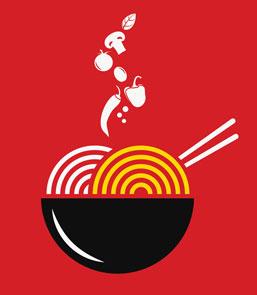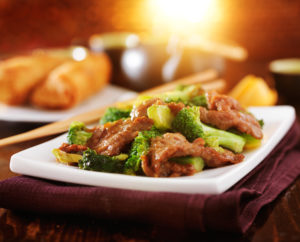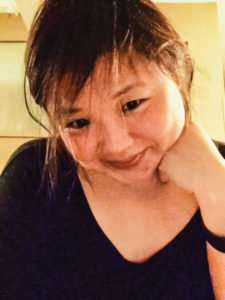
There are members of the American Jewish community who may honestly have a preference for lo mein over latkes, for hunan chicken over hamantaschen, for beef with broccoli over brisket and even for a plate of moo shu chicken over (scandal of scandals) a bowl of matzah ball soup.
Even if that’s not the case, there’s no denying that American Chinese food has become a beloved staple of the American Jewish diet.
But how exactly did cuisine from East Asia gain such an important place on the Jewish dinner table?

The JT spoke with a trio of experts — Rabbi Joshua Eli Plaut of the Metropolitan Synagogue of New York, author of “A Kosher Christmas: ‘Tis the Season to be Jewish”; Ted Merwin, Pikesville resident and author of “Pastrami on Rye: An Overstuffed History of the Jewish Deli”; and Jennifer 8. Lee, author of “The Fortune Cookie Chronicles: Adventures in the World of Chinese Food” — to uncover the secret history of Jews and Chinese food.
Open for Christmas?
There is a longstanding theory that Jewish people like Chinese food because Chinese restaurants were one of the few places open on Christmas.

However, Plaut refutes this theory. He said that Chinese restaurants being open on Christmas originally had nothing to do with the start of the growing fondness of Jews for Chinese food.
“Is that how the affinity began with Chinese food? Absolutely not,” said Plaut, who holds a doctorate in Judaic studies from New York University. “The affinity for eating Chinese food on Christmas was probably the last development.
“Probably, it was the eating out to casual Chinese restaurants during the week, to going out on Sundays, and then from there to patronizing Chinese restaurants on Christmas,” Plaut said.
Safe treyf
Both Plaut and Merwin, who holds a doctorate from The City University of New York, said that the Jewish affinity for Chinese food originated in New York City’s Lower East Side. An early reference to Chinese food’s growing popularity in the Jewish community comes from an article from the 1920s in Der Tog, a New York-based newspaper written primarily in Yiddish. The title of the piece, said Merwin, was “Down with gefilte fish, up with chop suey.”

“It obviously starts on the Lower East Side, at the turn of the 20th century, when Jews and Chinese [people] lived sort of cheek by jowl with each other, along with lots of other ethnic and immigrant groups,” said Merwin, a member of Chizuk Amuno Congregation.
While there were, of course, other immigrant communities with restaurants in the area, many had Christian iconography, such as pictures of venerated saints, that could be a turnoff to Jewish customers, Plaut explained. This, however, was not the case in Chinese restaurants, said Lee, producer of the documentary “The Search for General Tso.” She explained that Chinese restaurants had a more welcoming attitude toward Jewish patrons.
“At a time when a lot of Jews were very sensitive about how American they were, Chinese restaurants never looked down on Jews,” Lee said. “Because at least on the spectrum of American-ness and Eurocentric-ness, at least Jews were from Europe. So those restaurants were comfortable and welcoming in different ways.”
Additionally, there was no mixing of meat and milk in Chinese restaurants,
Plaut said, which was a significant plus for the restaurant-goer who was looking to keep kosher.
This of course is not to say that Chinese food was inherently kosher, as many of the dishes included pork. However, this did not prove to be the obstacle one might have expected.

“Chinese food uses a lot of pork and a lot of shellfish,” Lee said. “But for whatever reason, the rules were sometimes waived inside Chinese restaurants because it didn’t look like pork, it didn’t look like ham, it didn’t look like bacon, so like the little bits of meat inside an egg roll, or even, oddly, pork spare ribs, were kind of exempt from this rule.
“And I still have Jewish friends who are my generation, where the families don’t eat pork except in Chinese restaurants,” Lee added.
Plaut largely concurred, explaining that pork would often be hidden in things like wontons.
“They considered Chinese food safe treyf,” Plaut said. “It was something they enjoyed, it wasn’t an overt violation of dietary and kosher laws, and so you could eat there, and still enjoy it with a smile on your face … without feeling like you were really violating Jewish tradition.”
Business hours
Another important factor may have been that Chinese restaurants did not operate on a Christian calendar, said Lee. As such, they were typically open on Sundays, when many other restaurants were closed for the Christian Sabbath.
Plaut also believed Christian practices on Sundays had a hand in nudging Jews toward Chinese food.
“[Sunday] was church day for most Americans, followed by a lunch, and American Jews may have felt left out of that Sunday tradition amongst many Americans, and therefore went out to eat at restaurants on Sundays,” Plaut said. “And the patronage included Chinese food.”
A double life
In the earliest days of this tradition, other motives for eating at Chinese establishments may have included the inherent novelty of eating out at all, particularly for new immigrants who hadn’t had that option in the old country.
“There’s this whole tradition in the 1890s that immigrants started to eat out, something they never did in Eastern Europe,” Plaut said. “And it was prevalent really among immigrants who came from Eastern Europe, not really the resident German Jews in New York.”
Merwin, however, said the phenomenon began more with the children of those immigrants.
“We’re really talking about the children of immigrants, and we’re talking about how they were beginning in that interwar period to move more into the mainstream of American society,” Merwin said. “I would say it’s not so much the immigrant generation, even though there was that proximity of Jews and Chinese people to each other, probably less so them, but much more so for their children, because their children wanted to be American.”
Merwin saw a connection between an increase in secularization in America’s Jewish community during the early 20th century, which he saw as stemming partly from the antisemitism of the time, and the growing interest in Chinese food.
“During the 1920s, there was a pretty precipitous decline in the number of Jews who were keeping kosher,” Merwin said. “There was a lot of secularization that was going on in the Jewish community.”
During the 1920s and ‘30s, Jewish residents of places like Brooklyn or the Bronx might have kept kosher at home or when going out to a Sunday evening meal with their extended family, as in these situations they might be in view of their older relatives who consistently kept kosher, Merwin said. But when coming into Manhattan for their professional or social lives, these same Jews would be much more flexible about what they ate, creating a “bifurcated lifestyle” in which they kept kosher at some times while branching out to other cuisines at others.
Cosmopolitan cuisine
According to Lee, by the 1920s, eating Chinese food had become a way for American Jews to impress others socially by showing they were cosmopolitan, particularly those who had been born in Europe themselves.
“There was a time when there were Jewish immigrants who were much more sensitive about where they had come from,” Lee said. “Many had come from rural backgrounds, and Chinese food was a way to show you were worldly and sophisticated.”
Merwin saw things similarly, though he attributed this more to the grandchildren of Jewish immigrants in the 1950s and ‘60s.
“They were into traveling to foreign places, they were into sampling all different kinds of food, they were into showing that they were really cultured,” Merwin said.
At the same time, there may have been an uglier side to how Jewish customers of that generation viewed Chinese restaurants and their staff.
“Chinese people were still of a lower status than Jews were in society,” Merwin said. “So there was a kind of, for [lack] of a better word, a kind of racism that was inherent in being able to go to the Chinese restaurant and sort of feel culturally superior for the first time.”
Fusion of Chinese and Jewish
As Jews began moving out of major cities like New York and into other areas of the country, Chinese restaurants followed their customers, helping to account for their ubiquity today, Lee explained.
“You definitely see a flourishing of Chinese restaurants where there was a strong Jewish presence,” Lee said.
Today, Chinese food may be more closely tied with Jewish culture than ever. Lee noted how several of her Jewish friends commonly order Chinese for Shabbat dinner, while Merwin pointed to kung pao singles events for young Jews, as well as a Chicago deli, called the Eleven City Diner, which gives out fortune cookies on Christmas Eve. Lee also noted attempts to fuse Jewish and Chinese dishes, such as with pastrami egg rolls.
Turning the peking duck?
Despite all this history, times could be changing, with a wide variety of other cuisines more available now than perhaps ever before.
“My children didn’t grow up eating Chinese food,” Merwin said. “They grew up on Indian food. They don’t really have a huge fondness for Chinese food. They certainly don’t see it as a Jewish thing.”
Merwin saw the gravitation of Jews toward Chinese food as something that occurred for many reasons during a particular time in American history. And now, American Jews are gravitating away from it, he said, partly because American culture moves toward whatever is new and fashionable.
“Now you can’t even go to a Chinese restaurant without having sushi and pan-Asian, and now it’s hard to even find a decent Chinese restaurant in a lot of places, because people want to have such a huge amount of choice in terms of what they eat. They want to have a whole smörgåsbord every night for dinner,” Merwin said. “It’s inevitable, under those circumstances, that Chinese food is going to lose its specialness, when all these other kinds of food have come to the fore.”






